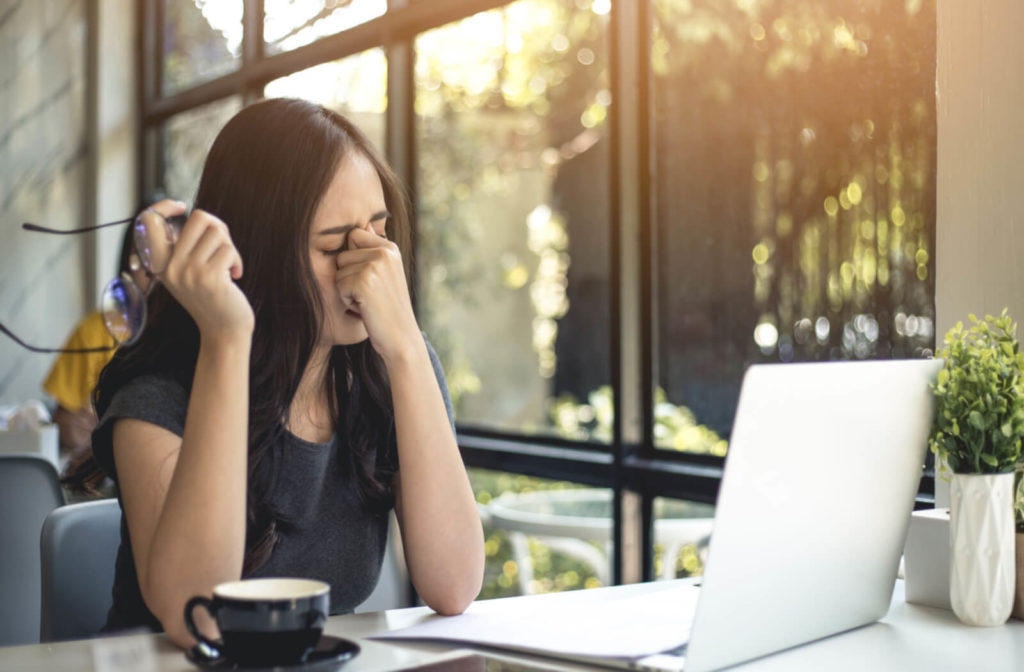The Effects of Caffeine on Eye Health
When most people think of caffeine and hydration, they probably remember that too much caffeine can lead to too many trips to the bathroom. But despite the common misconception, the link between dehydration and caffeine isn’t so cut and dry.
Dry eye can cause many harmful symptoms, including blurry vision, light sensitivity, and tissue damage. When patients experience chronic dry eye, an optometrist can prescribe dry eye therapy to help alleviate symptoms. While most recommendations involve adding treatment, there are some factors you might need to avoid or remove from your lifestyle.
But is caffeine one of the things that makes dry eye worse? Or can caffeine benefit eye health?
How Does Caffeine Work?
Caffeine is a natural stimulant commonly found in tea, coffee, and cacao plants. It can also be an ingredient in over-the-counter medications, energy drinks, weight loss supplements, and chocolate. About 80% of the global population consumes caffeinated products daily, reaching 90% of North American adults.
One of caffeine’s most notable effects is stimulating the brain and central nervous system. It blocks adenosine, a neurotransmitter that relaxes the brain and induces tiredness. As a result, caffeine helps you feel alert.
People tend to feel the effects of caffeine fast because it’s absorbed quickly from the gut into the bloodstream. For example, the caffeine found in one cup of coffee can reach the bloodstream in 20 minutes and reach full effectiveness within 1 hour.
Caffeine is also a natural diuretic, a substance that can help expel excess fluid from the body. It’s the reason drinking coffee can lead to frequent urination. Diuretics or water pills are sometimes prescribed for patients with high blood pressure or congestive heart failure.
Although diuretics like caffeine can increase thirst, diuretics won’t affect your hydration status. Drinking coffee or water can be equally hydrating. Still, consuming too much caffeine can dehydrate. So it’s crucial to find a healthy balance, or your morning coffee might contribute to morning dryness.
Morning Dry Eye
Drinking your morning coffee and turning on a digital screen tend to go together, whether you’re checking for new emails or browsing your favourite app. Your eyes discover your eyes feel dry or gritty, and wonder if your dehydrating coffee is the cause.
Waking up with dry eye can be like rolling out of the wrong side of the bed. Likewise, feeling motivated to complete tasks can be challenging when forcing your eyes to stay open because of dryness, irritation, or grittiness.
But your daily caffeine intake may not contribute to morning dry eye—unless you’re overcaffeinated or already dehydrated. Instead, poor sleep, dry climates, poor nutrition, digital eye strain, and other factors are more likely to influence your eye health.
Using air conditioning or a fan can also aggravate overnight dryness. Adding a humidifier to your bedroom, increasing your daily water intake, or limiting screen time before bed can prevent waking up with dry eye. You can keep enjoying your morning cup of joe.
However, there is a balance between how much caffeine is good for you and how much may worsen your dry eye symptoms.
Can Caffeine Alleviate Dry Eye?
Consuming caffeine is generally considered safe, although side effects associated with excess intake, such as anxiety, restlessness, sleep problems, tremors, and an irregular heartbeat.
According to the US Department of Agriculture (USDA) and the European Food Safety Authority (EFSA), consuming 400 mg of caffeine daily (about 2–4 cups of coffee) is safe for most people. But that comes with the warning that you shouldn’t consume more than 200 mg in one sitting.
Although there’s an upper limit to caffeine consumption, there are many potential health benefits, including:
- Boosting mood & decrease depression
- Enhancing exercise performance
- Lowering the risk of stroke & type 2 diabetes
- Stimulating metabolism & promoting fat loss
Although caffeine is a diuretic, it also contains the molecule xanthine. Studies have shown that topical application improves tear production, with preliminary research suggesting the same positive effects may occur when consumed.
Researchers are still working to discover how much caffeine is enough. But, while too much caffeine can be harmful, it won’t cause dry eye in healthy people.
However, if you like caffeine accompanied by sugar and cream, you may increase your risk of health problems. For example, excess sugar can harm your eye health and contribute to eye diseases that cause dry eye symptoms, including diabetes.
Conclusion
How much caffeine you consume—or don’t consume—shouldn’t be your only dry eye solution. Your optometrist can work with you to develop a plan that works for your lifestyle, regardless of your morning coffee habits. With dry eye therapy, you can enjoy your day without the feeling of gritty and tired eyes.
Contact the Queensway Optometric Centre for dry eye relief. We’ve been serving Mississauga for over 55 years. We strive to deliver quality care so you can feel comfortable with your vision. Request an appointment today to discuss dry eye solutions!


